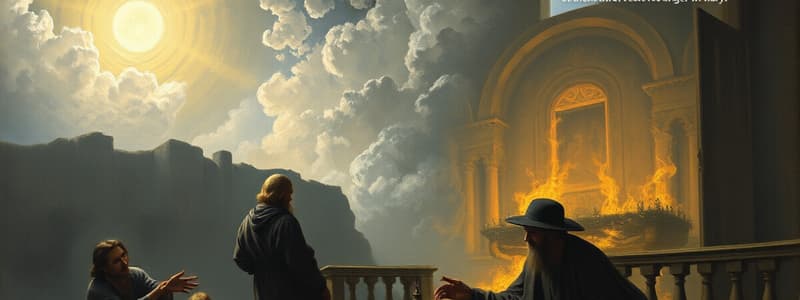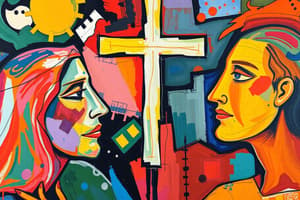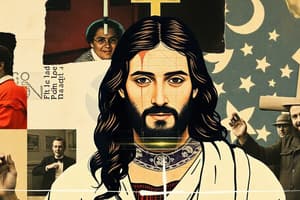Podcast
Questions and Answers
What does the word 'revelation' mean?
What does the word 'revelation' mean?
To unveil
What is the essential truth of our faith?
What is the essential truth of our faith?
God loves us and calls us to live in response to his love, now and forever.
What are two other names for the Scripture?
What are two other names for the Scripture?
Bible, God's Word
What is the Scripture?
What is the Scripture?
What is the meaning of 'divine inspiration'?
What is the meaning of 'divine inspiration'?
What do we mean by Sacred Tradition?
What do we mean by Sacred Tradition?
What do we mean by Deposit of Faith?
What do we mean by Deposit of Faith?
Who is the 'true author of the Bible' and why?
Who is the 'true author of the Bible' and why?
How is the Bible best described?
How is the Bible best described?
Why do we say that the Bible is like a library?
Why do we say that the Bible is like a library?
What is the derivation of the word 'Bible' (biblia)?
What is the derivation of the word 'Bible' (biblia)?
What are other names for the Old Testament and New Testament?
What are other names for the Old Testament and New Testament?
How many books are there in the canons of the Catholic and Protestant bibles?
How many books are there in the canons of the Catholic and Protestant bibles?
From which canon is the Catholic Bible derived?
From which canon is the Catholic Bible derived?
From which canon is the Protestant Bible derived?
From which canon is the Protestant Bible derived?
What are the categories of books in the Old Testament?
What are the categories of books in the Old Testament?
What are the 'deuterocanonical books'?
What are the 'deuterocanonical books'?
What is the Pentateuch?
What is the Pentateuch?
What are two other ways we describe the books of the Pentateuch?
What are two other ways we describe the books of the Pentateuch?
Which book of the New Testament describes the early history of the Church?
Which book of the New Testament describes the early history of the Church?
Which book of the New Testament is an example of apocalyptic literature?
Which book of the New Testament is an example of apocalyptic literature?
What do we call the first (and most important) books of the New Testament?
What do we call the first (and most important) books of the New Testament?
According to the American Bible Society, how many Bibles are distributed each year?
According to the American Bible Society, how many Bibles are distributed each year?
In what languages was the Bible originally written?
In what languages was the Bible originally written?
Who translated the Bible into Latin?
Who translated the Bible into Latin?
What is the Latin version of the Bible known as?
What is the Latin version of the Bible known as?
What do we mean by 'canon'?
What do we mean by 'canon'?
What do we mean by oral tradition?
What do we mean by oral tradition?
What is another name we use to describe the father of a Hebrew tribe?
What is another name we use to describe the father of a Hebrew tribe?
Can you describe five religious or spiritual truths we learn from the story of Creation?
Can you describe five religious or spiritual truths we learn from the story of Creation?
Who delivered the 'new covenant' to God's people?
Who delivered the 'new covenant' to God's people?
When were the first books of the Bible written?
When were the first books of the Bible written?
What are synagogues?
What are synagogues?
Describe the development of the Old Testament.
Describe the development of the Old Testament.
Describe the development of the New Testament.
Describe the development of the New Testament.
What do we mean by 'kerygma'?
What do we mean by 'kerygma'?
What does the word 'gospel' mean?
What does the word 'gospel' mean?
Who wrote the Gospels?
Who wrote the Gospels?
What are 'epistles'?
What are 'epistles'?
What is the 'Magisterium'?
What is the 'Magisterium'?
What is the role of the Magisterium?
What is the role of the Magisterium?
How does the Magisterium fulfill its role?
How does the Magisterium fulfill its role?
Can you cite two biblical passages using abbreviations?
Can you cite two biblical passages using abbreviations?
What does the Sacred Tradition consist of?
What does the Sacred Tradition consist of?
God's Truth consists of both Scripture and Tradition. What is Scripture and Tradition referred to?
God's Truth consists of both Scripture and Tradition. What is Scripture and Tradition referred to?
How is the 'deposit of faith' God's Truth?
How is the 'deposit of faith' God's Truth?
What are the categories of books in the New Testament?
What are the categories of books in the New Testament?
What does the word 'Pentateuch' mean?
What does the word 'Pentateuch' mean?
What is St. Jerome the patron saint of?
What is St. Jerome the patron saint of?
Flashcards are hidden until you start studying
Study Notes
Revelation and Scripture
- Revelation means "to unveil" in Latin, originating from a Greek term.
- The core belief of faith is that God loves humanity and calls them to reciprocate His love eternally.
- The Scripture, also known as the Bible or God's Word, is a written account of God's revelation and His interactions with people.
- "Divine inspiration" refers to the unique guidance provided by the Holy Spirit to the human writers of the Bible.
Sacred Tradition and Deposit of Faith
- Sacred Tradition encompasses the teachings and practices of Jesus, passed down through the Apostles and the Church.
- The "Deposit of Faith" includes both Scripture and Tradition, forming the essential foundations of faith.
Canon and Structure of the Bible
- God is recognized as the true author of the Bible, utilizing human authors as instruments.
- The Bible serves as a collection of 73 books, inspired by the Holy Spirit over nearly 2000 years, resembling a library.
- The term "bible" is derived from the Greek word for "books."
The Testaments and Canonical Variations
- The Old Testament is also referred to as the Hebrew Scriptures, while the New Testament is known as the Christian Scriptures.
- The Protestant Bible contains 66 books, lacking the deuterocanonical texts, whereas the Catholic Bible includes 73 books.
- The Catholic Bible is based on the Alexandrine Canon, while the Protestant Bible follows the Jewish Canon.
Old Testament Composition
- The Old Testament includes various categories of books: Pentateuch, Historical Books, Wisdom Books, and Prophetic Books.
- Deuterocanonical books, disputed in some traditions, include Sirach, Tobit, Wisdom, 1&2 Maccabees, Judith, and Baruch, along with parts of Daniel and Esther.
- The Pentateuch, also known as the Torah or Law, details God's covenant with the Israelites.
New Testament Insights
- The Acts of the Apostles details the early history of the Church, while the Book of Revelation exemplifies apocalyptic literature.
- The first and pivotal books of the New Testament are called the Gospels, authored by Matthew, Mark, Luke, and John.
Bible Distribution and Language
- Annually, the American Bible Society distributes around 200 million Bibles globally.
- The Old Testament is primarily in Hebrew; the New Testament is predominantly in Greek and Aramaic.
Historical Context and Translation
- St. Jerome translated the Bible into Latin, known as the Vulgate.
- "Canon" refers to the official listing of biblical books.
Tradition and Teaching
- Oral tradition involves passing biblical stories verbally through patriarchs.
- A patriarch is another term for the father of a Hebrew tribe.
Creation and Covenant
- Key truths from the Creation story include: God created everything, creation reflects His love, humanity is made in His image, and all creation is deemed good.
- Jesus Christ delivered the New Covenant to God's people.
Biblical Development
- The Old Testament developed from Religious Experience to Oral Tradition to Inspired Writing.
- The New Testament evolved from Religious Experience to Kerygma to composed Letters and Gospels.
Kerygma and Gospel Meaning
- Kerygma denotes the preaching by the Apostles and early disciples, with "gospel" signifying "Good News."
- Epistles are formal letters to early Christian communities regarding God's revelations.
Church’s Teaching Authority
- The Magisterium, consisting of the Pope and Bishops, serves as the Church's teaching authority.
- With the Holy Spirit's assistance, the Magisterium interprets Scripture and Tradition, guiding their application in daily life.
- The Magisterium communicates teachings through various letters and documents.
Sacred Tradition and Deposit of Faith
- Sacred Tradition comprises the Church's accumulated teachings, documents, worship practices, and prayers.
- The Deposit of Faith, inspired by the Holy Spirit, encompasses Scripture and Tradition, essential for guiding the faithful.
Biblical Literature
- The New Testament consists of Gospels, Letters, and other writings, such as Acts and Revelation.
- The term "Pentateuch" translates to "Five Scrolls," referring to the first five books of the Bible.
- St. Jerome is the patron saint of biblical scholars.
Studying That Suits You
Use AI to generate personalized quizzes and flashcards to suit your learning preferences.




